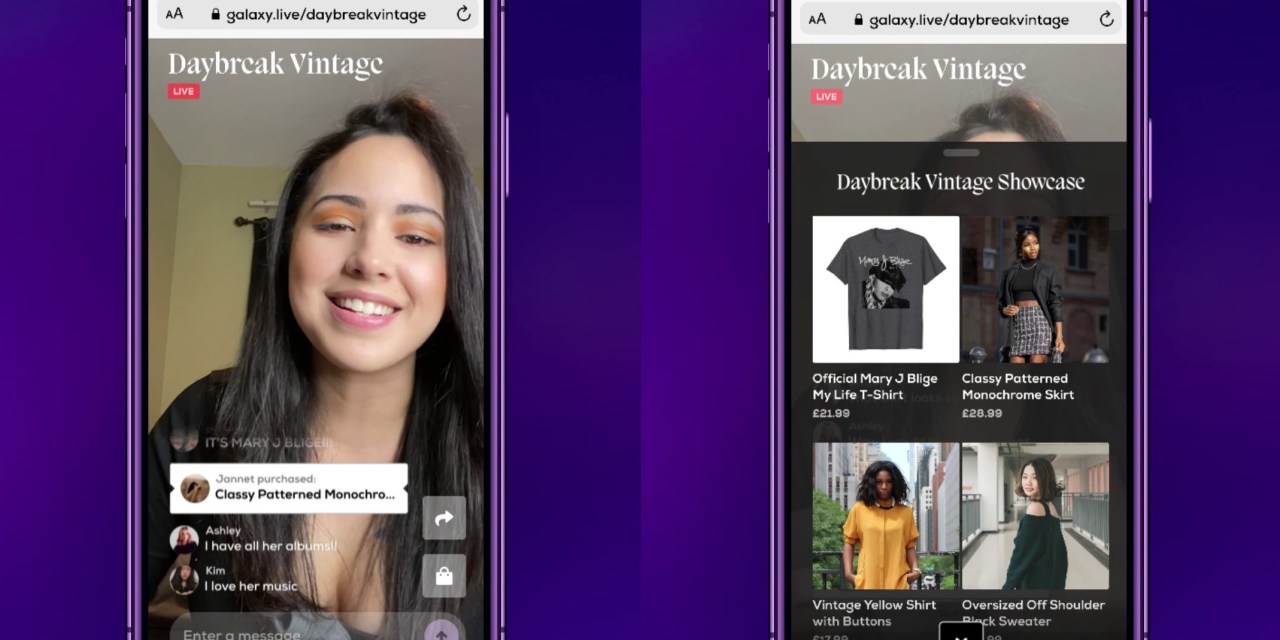Galaxy Live is betting on influencers and resale to stand out in the crowded livestream shopping space

A new livestream platform aims to attract influencers that traditionally relied solely on Instagram or TikTok for revenue.
Last week, Galaxy, a marketplace that combines live selling and resale, launched on iOS and the web. The company’s hope is that its unique no-fee, revenue-sharing model will attract influencers looking to diversify the ways they make money, who in turn will bring their built-in audiences.
During the pandemic, more platforms and brands have started investing in livestream shopping. A number of apps — like NTWRK, Popshop Live and Whatnot, which host live shopping shows — have received millions in venture capital funding. In July, for example, Popshop Live raised a $20 million round and became valued at $100 million. Meanwhile, Facebook and Amazon have also ramped up their live shopping tools. The challenge that all of these livestream shopping efforts face is convincing large swaths of people to tune in. Galaxy is trying to stand out by attracting popular influencers, first and foremost.
“We started Galaxy to help creators break out of the ad-based model,” said Galaxy co-founder and CEO Danny Quick, explaining that long-term monetization on channels, like Instagram and TikTok, is becoming more difficult. Instagram and parent company Facebook, for example, don’t currently offer an ad revenue sharing program. In contrast, YouTube allows well-followed channels the option to run paid ads (and has been testing out shoppable branded services).
Galaxy works by having hosts create a trailer and homepage for their storefronts. Galaxy gives each merchant their own broadcast channel and store page, from which they can sell directly to followers. Their backend dashboard also shows them real-time metrics, which the co-founders say helps them understand their audience’s engagement rate and spending habits. The model, Quick explained, relies less on peer-to-peer sales and focuses on the merchants’ own shows and accompanying audience.
Recruiting influencers is nothing new, and platforms like Popshop Live and Amazon Live have both leaned on them to host live shows. However, one of Galaxy’s biggest differentiators is that it will not take a commission fee on transitions. Popshop Live, for instance, keeps a 6% service fee from users.
Quick explained that the platform is seeking out creators who may not necessarily be able to woo big brand partnerships. While brand deals are lucrative for a select few, the model has also made it difficult for many micro-creators and entrepreneurs to build sustainable businesses on the platforms. “We want to make it as easy as possible to bring their audience with them and be the stars of the platform,” said Quick.
Ad position: web_incontent_pos1
At the moment, Galaxy takes no commission or fees from sales, Quick said. But the company plans to implement a premium subscription that grants access to additional sales and marketing tools.
The platform also taps into another booming trend: resale. “Vintage, upcycled and handmade items are in demand right now,” Quick said. Galaxy decided to focus on resale due to the fact that it’s an increasingly popular segment of retail, and also to attract creators that feature handmade or vintage content. For example, content creator Ms. Maverick Muse — known for showcasing vintage-inspired looks on TikTok to nearly 180,000 followers — was chosen as one of Galaxy’s launch merchants.
Galaxy has signed on about 200 creators and influencers to sell via live shows on their platform. “So far, 95% of creators who have gone live on Galaxy have already scheduled follow-up shows,” Quick said. Most of the creators are Gen Z, said Galaxy co-founder Nathan McCartney. Many were chosen to join based on several factors, including personal style, audience and their ability to host engaging shows.
Many of Galaxy’s current hosts aren’t necessarily major influencers with big brand deals — the majority have an existing following of under 100,000 Instagram followers. Quick said that the platform wants to strike a balance between micro-influencers with niche followings, as well as more popular ones looking for an audience interested in testing resale and sustainable fashion. For instance, some bigger accounts could use Galaxy to sell limited edition items or capsule wardrobe collections.
One of the challenges Galaxy faces is in building a large enough audience that makes it worthwhile for influencers to spend more time on Galaxy, and less time on Instagram and TikTok, which have hundreds of millions of users.
Ad position: web_incontent_pos2
To that end, in preparation of the launch, Galaxy has built tools to help creators market the platform to their existing fans. One of those tools is HyperGalaxy, a marketing support program for creators to find and attract audience members. Through HyperGalaxy, hosts can invite people via SMS to RSVP to their shows in advance. Creators then have the ability to send everyone on their list a text alert when they go live. After that, they can use the texting line to directly send updates to their followers. Creators have seen a 30% sales conversion rate from users sharing their number after landing on their page, according to Quick.
The company also recently launched Galaxy Academy, a tutorial program to help hosts plan their live shows. Longterm, Galaxy said it hopes to partner with entertainment and retail brands.
Ali Fazal, vp of marketing at influencer marketing platform Grin, explained that social platforms don’t own their audiences the way they used to. “Now, it’s all about individuals that are bringing their followers with them,” he said. At the same time, Fazal said, “brands are realizing that creators aren’t generic, walking billboards” who can be swapped out.
A platform like Galaxy could make the dynamics between an influencer and brand more complicated. With a format like livestreaming, most hosts are doing the heavy lifting of providing one-on-one, personalized interactions with potential customers.
More and more, these influencers will have opportunities to strike out and join higher-compensating platforms, Fazal noted, which is precisely the trend a platform like Galaxy is banking on.

